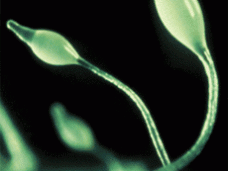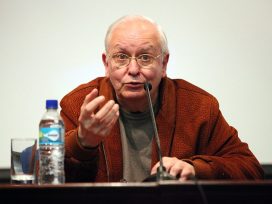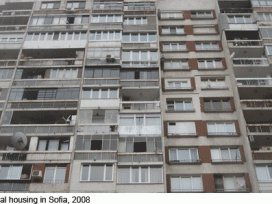Janez Potocnik, head of the Slovenian negotiating team during the country’s EU accesssion and as from February 2010 European Commissioner for the Environment, explains why a European perspective for the Balkan countries is essential for Europe as a whole, and the role of Sarajevo Notebook in cultivating dialogue in the region.
Articles
Read more than 6000 articles in 35 languages from over 90 cultural journals and associates.
The lady anatomist
Interview with Sue Black
“Sometimes we forget that maybe we need to ask more questions about the situation we are getting into. Then we have the right to say no.” In 1999, forensic anthropologist Sue Black joined a British UN Forensic Team investigating mass graves in Kosovo, and has since been to Sierra Leone and Iraq. She talks to the journal Intellectum about how she came to work in warzones, and why, despite everything, she loves what she does.
Postmodernist historians of everyday life in totalitarian societies have underrated the role of ideology at the individual level, preferring a performative reading of subjectivity. Yet this fails to explain why the Soviet and Nazi regimes generated absolute commitment, writes Jochen Hellbeck. What is needed, he argues, is an understanding of how ideology is generated in individual acts of appropriation and self-becoming.
An Albanian girl is caught between the patriarchal cruelty of village life and the communist assault on traditional values. She flees to Tuzla in Bosnia, in the hope of finding the freedom to live as a woman denied her by the custom of “sworn virginity”.

In the emergent “panspectric” order, human society is seen in terms of “information traffic”. It is not the actions of individuals that are observed, as in the Foulcauldian panopticon, rather those of the mass. Degrees of corporate and state surveillance are unprecedented; yet panspectric subjectivity also brings new forms of resistance.
“To say that reason is only desiccating and too dry is a dangerous caricature. No less dangerous is to eliminate the place for arts, for myth, which is a different kind of knowledge of the world. We have to be cautious about both dangers, both reductions.” On the publication of his new book In Defence of the Enlightenment, Tzvetan Todorov tells British philosopher AC Grayling why the Enlightenment must be separated from scientism and cultural chauvinism.
The few regulatory measures introduced since the financial collapse in 2008 are being supervised by the same banking sector that caused it in the first place, writes Financial Times journalist Lucas Zeise. Governments’ delegation of regulatory responsibilities has deeply negative implications for democracy.
Only a small “creative class” achieves the creativity and freedom attributed by stereotype to all knowledge workers, writes Christopher Newfield. Below this elite exist far more numerous “perma-temps”, who are highly qualified yet interchangeable. In the American university system, which has parallels in Europe, recipients of higher education are increasingly prepared for a working life in a knowledge economy where independence and social protections have been eroded.
350 million do it regularly. It offers levels of complexity and human interaction beyond any other art form. We can’t continue to ignore the cultural impact of online gaming, says Michael Bywater.

The defender of contingency
An interview with Ernesto Laclau
Ernesto Laclau talks to the Greek journal Intellectum about the uses of populism, why radical democracy has nothing to do with liberalism, and how lack of political competition benefits the far-Right.
Obama’s proposed banking reforms are likely to face insurmountable opposition from Congress, where lobby interests have become all-powerful. Worse still, writes George Blecher, the proposals themselves don’t go far enough.

“Democracy” in post-communist Europe is strongly associated with high levels of state-sponsored social protection, indicating a culture far removed from the prevalent system of market-mediated private provision. The dissatisfaction with democracy expressed by the many not to have benefited from transition suggests CEE welfare states have a long way to go before they attain western levels of credibility. Their democracies depend on that gap being bridged.
Mira Meksi regrets the state of philosophy publishing Albania: secondary literature abounds but the original works themselves remain untranslated, and publishers operate a scattergun approach, lacking any sense of historical development in the field and responding entirely to intellectual fashion.
Jytte Klausen’s book “The Cartoons That Shook the World” (published by Yale University Press) is the first scholarly examination of the notorious controversy that erupted in 2006. Three years ago, she set out to unravel the genesis of the debacle and to analyse the cartoons and their impact. Last summer, several months before publication, Yale University Press unexpectedly took the decision not to publish the cartoons in her book.
Kafka’s home city has a lot to hide, writes James Hawes. The Czech capital’s architectural debt to greater Germany; its authoritarian past and history of anti-Semitism; even its most famous son’s penchant for pornography – these unwelcome truths are bad for business.